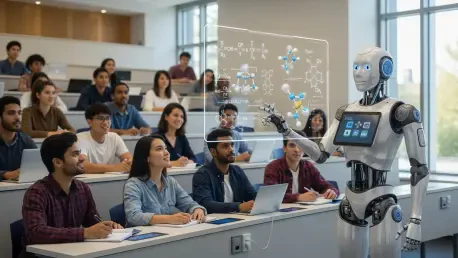In recent years, artificial intelligence has started revolutionizing educational environments, reshaping how students learn and institutions operate. As digital solutions grow more sophisticated, there’s the potential to transform individual learning experiences significantly, tailoring them to meet each student’s needs. However, with this potential comes the challenge of balancing technological convenience with preserving essential human interactions that foster personal and professional growth.
Unpacking the Role of AI in Modern Education
Artificial intelligence provides an adaptive and personalized learning experience, meeting diverse educational needs. AI-driven tools, such as chatbots and custom learning platforms, offer immediate support and feedback. This digital transformation allows institutions and students alike to navigate the complexities of education in a fast-paced world effectively. Yet, this reliance on technology raises questions about student independence, career preparation, and social interaction.
Personalized Learning and Its Impacts
AI’s ability to personalize learning experiences offers numerous educational advantages. Tailored content can address individual student needs, adapting to both strengths and weaknesses to maximize learning outcomes. With AI’s increasing integration, students can more effectively manage workloads, access resources, and hone their skills. However, the ease of access may inadvertently reduce students’ incentives to engage with professors and classmates, potentially diminishing the benefits of mentorship and peer interaction.
Easing the Administrative Burden
Beyond learning, AI is revolutionizing administrative processes, streamlining operations within educational institutions. Automated systems facilitate tasks such as scheduling, grading, and resource management, enhancing overall efficiency. While this may reduce administrative burdens and allow educators to focus more on teaching, it presents challenges regarding the potential over-reliance on digital tools at the expense of traditional human roles in education.
Emerging Trends and Developments
The last few years have seen significant progress and developments in AI educational technologies. Innovations such as intelligent tutoring systems, enhanced virtual classrooms, and analytics-driven insights are shaping today’s learning landscapes. The increasing application of machine learning and natural language processing in education heralds a shift in how institutions design and deliver educational content, making it more accessible and adaptable to diverse learning preferences.
Implementing AI in Real-World Education
Numerous educational institutions have begun to implement AI with varying applications. AI supports tasks ranging from personalized tutoring and curriculum development to managing classrooms autonomously. Notable use cases include universities harnessing AI platforms to predict student outcomes and identify those at risk of falling behind, demonstrating AI’s potential to create supportive and responsive learning communities.
Addressing Challenges and Recognizing Limitations
Despite its transformative potential, AI in education encounters several challenges. Technical hurdles, such as ensuring data privacy and managing large datasets, pose significant obstacles. Moreover, the regulatory landscape remains complex, with market dynamics affecting the pace of AI integration. Addressing these challenges demands sustained research efforts and collaborative innovations focused on developing AI systems that are fair, transparent, and accountable.
Prospects for the Future
Looking towards the horizon, AI in education possesses unprecedented opportunities to redefine learning. Potential breakthroughs in AI-driven analytics could further personalize educational experiences, enhance remote learning capabilities, and improve access to quality education worldwide. However, achieving these outcomes requires a dedicated focus on fostering both technological and interpersonal growth, ensuring technology supplements rather than replaces traditional educational practices and relationships.
Conclusion
AI technologies have significantly impacted the educational landscape, offering valuable resources for students and educators. While AI allows for increased efficiency and personalized learning experiences, the need for balance is paramount. As institutions continue integrating AI tools, it’s crucial to nurture interpersonal relationships that support social and professional development. By addressing challenges and leveraging AI’s benefits wisely, education can become more inclusive, responsive, and ultimately more effective in preparing students for future success.









